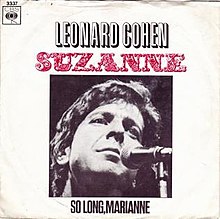
"In the Air Tonight" is the debut solo single by English drummer and singer-songwriter Phil Collins. It was released as the lead single from Collins's debut solo album, Face Value, in January 1981.

Songs of Leonard Cohen is the debut album by Canadian singer-songwriter Leonard Cohen, released on December 27, 1967, on Columbia Records. Less successful in the US than in Europe, Songs of Leonard Cohen foreshadowed the kind of chart success Cohen would go on to achieve. It reached number 83 on the Billboard 200. It peaked at number 13 on the UK Albums Chart, spending nearly a year and a half on it.

Songs of Love and Hate is the third studio album by Canadian singer-songwriter Leonard Cohen. Produced by Bob Johnston, the album was released on March 19, 1971, through Columbia Records.
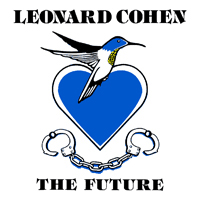
The Future is the ninth studio album by the Canadian singer-songwriter Leonard Cohen, released in 1992. Almost an hour in length, it was Cohen's longest album up to that date. Both the fall of the Berlin Wall and the 1992 Los Angeles riots took place while Cohen was writing and recording the album, which expressed his sense of the world's turbulence. The album was recorded with a large cast of musicians and engineers in several different studios; the credits list almost 30 female singers. The album built on the success of Cohen's previous album, I'm Your Man, and garnered overwhelmingly positive reviews. The Future made the Top 40 in the UK album charts, went double platinum in Canada, and sold a quarter of a million copies in the U.S., which had previously been unenthusiastic about Cohen's albums.

Songs from a Room is the second album by Canadian musician Leonard Cohen, released in 1969. It reached No. 63 on the US Billboard Top LPs and No. 2 on the UK charts.

Ten New Songs is Leonard Cohen's tenth studio album, released in 2001. It was co-written and produced by Sharon Robinson. It was produced in Cohen's and Robinson's home studios in Los Angeles. It was also his first album in nearly 10 years. The album peaked at #143 on the Billboard 200, #4 in Canada, #1 in Poland and #1 in Norway.

I'm Your Man is the eighth studio album by Canadian singer Leonard Cohen, released on February 2, 1988 by Columbia Records. The album marked Cohen's further move to a more modern sound, with many songs having a synthesizer-oriented production. It soon became the most successful studio album which Cohen had released in the US, and it reached number one in several European countries, transforming Cohen into a best-selling artist.

Various Positions is the seventh studio album by Leonard Cohen, released in December 1984. It marked not only his turn to a modern sound and use of synthesizers, but also, after the harmonies and backing vocals from Jennifer Warnes on the previous Recent Songs (1979), an even greater contribution from Warnes, who is credited equally to Cohen as vocalist on all of the tracks.

"Hallelujah" is a song written by Canadian singer Leonard Cohen, originally released on his album Various Positions (1984). Achieving little initial success, the song found greater popular acclaim through a new version recorded by John Cale in 1991. Cale's version inspired a 1994 recording by Jeff Buckley that in 2004 was ranked number 259 on Rolling Stone's "The 500 Greatest Songs of All Time".

"Ruby Tuesday" is a song recorded by the Rolling Stones in 1966, released in January 1967. The song became the band's fourth number-one hit in the United States and reached number three in the United Kingdom as a double A-side with "Let's Spend the Night Together". The song was included in the American version of Between the Buttons.
"Famous Blue Raincoat" is a song by Leonard Cohen. It is the sixth track on his third album, Songs of Love and Hate, released in 1971. The song is written in the form of a letter. The lyric tells the story of a love triangle among the speaker, a woman named Jane, and the male addressee, who is identified only briefly as "my brother, my killer."
"Bird on the Wire" is a song written by Canadian musician Leonard Cohen, which became one of his signature songs. It was recorded 26 September 1968 in Nashville and included on his 1969 album Songs from a Room. A May 1968 recording produced by David Crosby, titled "Like a Bird", was added to the 2007 remastered CD. Judy Collins was the first to release the song on her 1968 album Who Knows Where the Time Goes. Joe Cocker also covered the song on his second studio album the following year and his version reached #78 in Canada.
"Everybody Knows" is a song written by Canadian singer-songwriter Leonard Cohen and collaborator Sharon Robinson. It has often been covered and used in soundtracks.
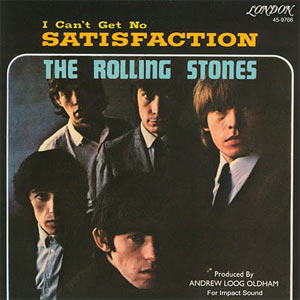
"(I Can't Get No) Satisfaction" is a song by the English rock band the Rolling Stones. A product of Mick Jagger and Keith Richards' songwriting partnership, it features a guitar riff by Richards that opens and drives the song. The riff by Richards is widely considered one of the greatest hooks of all time. The song's lyrics refer to sexual frustration and commercialism.

"Comment te dire adieu" is a French adaptation of the song "It Hurts to Say Goodbye". It was originally recorded by Françoise Hardy in 1968.

The Essential Leonard Cohen is a career-spanning collection of Leonard Cohen songs released in 2002. It is part of Sony's The Essential series.
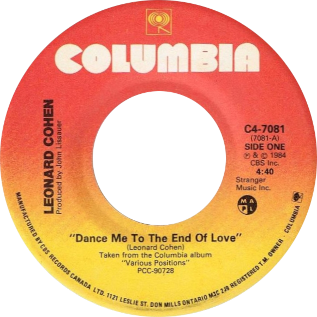
"Dance Me to the End of Love" is a 1984 song by Canadian singer Leonard Cohen. It was first performed by Cohen on his 1984 album Various Positions. It has been recorded by various artists and in 2009 was described as "trembling on the brink of becoming a standard."

Leonard Cohen was a Canadian singer-songwriter and poet who was active in music from 1967 until his death in 2016. Cohen released 14 studio albums and eight live albums during the course of a recording career lasting almost 50 years, throughout which he remained an active poet. His entire catalogue is available on Columbia Records. His 1967 debut Songs of Leonard Cohen earned an RIAA gold record; he followed up with three more highly acclaimed albums: Songs from a Room (1969), Songs of Love and Hate (1971) and New Skin for the Old Ceremony (1974), before allowing Phil Spector to produce Death of a Ladies' Man for Warner Bros. Records in 1977. Cohen returned to Columbia in 1979 for Recent Songs, but the label declined to release his next album, Various Positions (1984) in the US, leaving it to American shops to import it from CBS Canada. In 1988, Columbia got behind Cohen again and gave full support to I'm Your Man, which brought his career to new heights, and Cohen followed it with 1992's The Future.
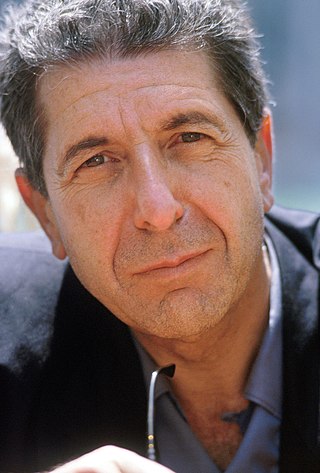
Leonard Norman Cohen was a Canadian singer-songwriter, poet, and novelist. Themes commonly explored throughout his work include faith and mortality, isolation and depression, betrayal and redemption, social and political conflict, and sexual and romantic love, desire, regret, and loss. He was inducted into the Canadian Music Hall of Fame, the Canadian Songwriters Hall of Fame, and the Rock and Roll Hall of Fame. He was invested as a Companion of the Order of Canada, the nation's highest civilian honour. In 2011 he received one of the Prince of Asturias Awards for literature and the ninth Glenn Gould Prize.
"So Long, Marianne" is a song written by Canadian poet and musician Leonard Cohen. It was featured on his debut album, Songs of Leonard Cohen.
